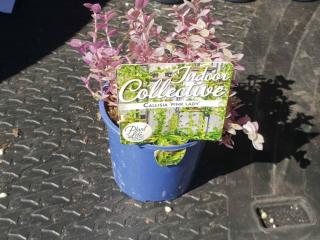Home gardeners in Western Australia are commended for heeding a call to help prevent the establishment of a decorative declared plant mistakenly sold in WA over summer, but more are encouraged to do the right thing.
Callisia repens (Jacq.) L. is an herbaceous perennial succulent, also known as creeping edge plant and Callisia ‘Pink Lady’. It can be found in other states but is prohibited in Western Australia due to its potential impact on the environment.
The prohibited plant was sold during December and January at Bunnings stores in the Perth metropolitan area and in Albany, Kalgoorlie, Geraldton, Bunbury and Busselton regions.
The Department of Primary Industries and Regional Development is urging gardeners who purchased a Callisia ‘Pink Lady’ to return plants bought to any Bunnings store for a full refund or call +61 (0)8 9368 3080 to arrange collection.
Department Priority Weeds manager Kay Bailey said the department had been working with Bunnings to raise awareness and recover the 800 plants sold.
“With more than 300 plants returned so far, the response from gardeners has been positive but we need more plants returned to reduce the potential for the pest to spread and harm our agricultural industries or environment,” Ms Bailey said.
“There has been a high number of plants returned in some metropolitan areas, including 87 per cent from Bunnings’ Harrisdale store and 80 per cent from Cockburn.
“However, it’s vital that gardeners from across Perth, and particularly the regional areas of Bunbury, Kalgoorlie, Geraldton and Esperance, check whether Callisia Pink Lady is among the plants they recently bought and if so, return them.”
Callisia Pink Lady is a hardy plant with creeping stems that grow into dense mats of vegetation which could create problems across a wide range of environments in Western Australia.
It has the potential to become widespread in riparian vegetation, along roadsides, forest margins, disturbed sites and waste areas.
A native of Mexico, Central America and South America, the plant spreads by seed and stem segments, which enables it to spread easily via garden waste.
Callisia Pink Lady is a low growing plant up to 10cm tall and about 1.2m in width, with small white flowers that appear in late spring or early summer.
Its leaves are densely clustered along the stems and become smaller and more distant from each other along the flowering stems. Sized from 1 to 4 cm long, the leaves are usually green above and purple underneath.
Suspect plants can be reported to the department’s Pest and Disease Information Service on +61 (0)8 9368 3080 or email a photo and enquiry to padis@dpird.wa.gov.au.
The department is investigating the entry of Callisia Pink Lady seedlings into Western Australia.

Media contacts: Jodie Thomson/Dionne Tindale, media liaison +61 (0)8 9368 3937
